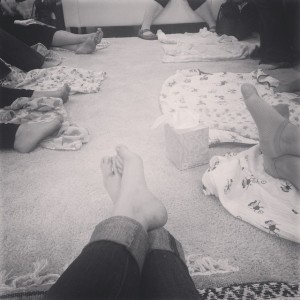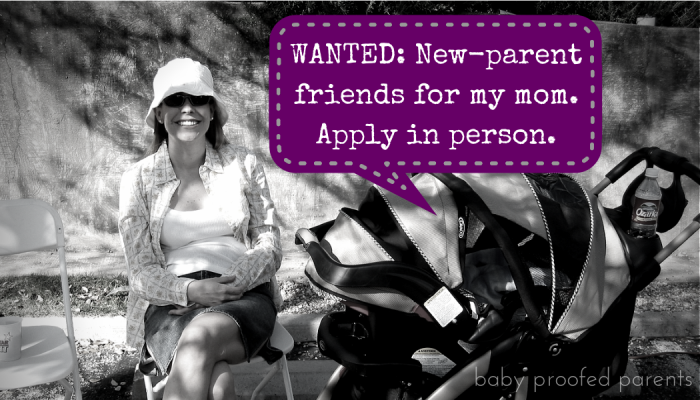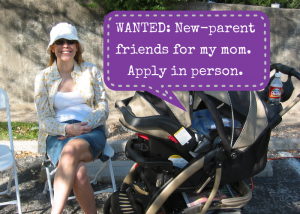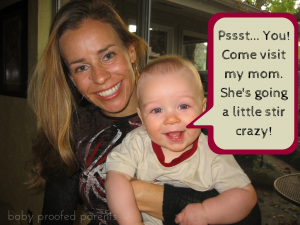This invaluable list of suggestions for new parents was originally posted on the Austin Born Blog. We loved it so much, we asked if we could share it with our followers. The list was compiled by a group of new mothers who were attending The Circle, a postpartum group offered for when motherhood is not Pinterest perfect.
This new motherhood gig can be tough — we believe that support from our peers is an important part of working through the struggles and ultimately finding joy. At the last Circle meetup, we talked about how a mother is born every time that a first baby is born. In spite of this truth, becoming a mother is not always something that happens simply and effortlessly. In fact, we are finding that giving birth to this new aspect of our identities is a lot more challenging than we thought it would be, back in our pre-baby days. We all spent a lot of time preparing for the birth of our babies–we took classes, hired doulas, read books, bought stuff–but so little time and energy preparing our selves to become mothers. We wanted to offer some advice to our friends who haven’t had their babies yet, so they could be a bit more prepared than we were. Here is our collective wisdom, from some new mamas to soon-to-be mamas:
Plan.
Don’t wait to figure it out on the fly. Don’t obsess about the birth to the exclusion of what comes after. The birth is one day (maybe two), but your baby will be yours for the rest of your life.
Start now reflecting on your needs and planning ahead for the weeks and months after baby. Think, “Who am I? What things do I need to have space and time to do to feel like myself?” This could be anything from time to read the New York Times on Sunday morning to a chance to go to Target by yourself to whatever floats your boat. What do you need to feel like you? Communicate this to your partner and make it a priority after baby.
Find help and outsource what you can before baby arrives.
Find a new mom group and a lactation consultant before you desperately need them and are too tired and frazzled to search.
Instead of a lot of cute onesies, register for things like a prepared meal service, diaper service, cleaning service, postpartum doula care, and new mom group fees (such as an AustinMama Pass or Partners in Parenting). This kind of stuff is going to help you a lot more than 20 receiving blankets.
Slow down.
You are not going to bounce back to your old life anytime soon after giving birth. You will have more on your plate than you can imagine right now, and the demands of your baby will at times seem overwhelming. Do not expect to do everything or even most things you used to do.
Celebrate the small achievements.
Driving alone with baby for the first time. Waking up before your baby does without panicking that she/he has stopped breathing. Brushing your teeth and taking a shower before noon. Right now you can’t imagine how enormous these accomplishments will seem to you, but when they come, celebrate them. Tell yourself what an amazing job you are doing, and be proud.
Tell your friends to keep calling you.
Sometimes a big gulf can open up between friends-who-are-now-moms and friends-who-are-child-free. This doesn’t have to be so, and no one really wants it to happen. So tell your friends to keep inviting you to things, but to not take it personally or give up asking if you decline the invitation 9 times out of 10. It is nice to know that people still want you around.
You can’t win.
No matter what choice you make, there will be guilt and blame. If you choose to stay home with your child and not return to paid work right away, you will miss being with people and feeling the sense of accomplishment you used to feel at your job well done. If you choose to return to your outside job, you will feel guilty about leaving your child with others and even about enjoying your time away. This is just one hot-button example, but there are a million parenting decisions to make about feeding/sleeping/diapering/training/clothing/whatever your child, and there will always be a voice in your head and several voices around you telling you that you have chosen wrongly. You have to decide what is right for you, and tell everyone (including your own inner guilt-voice) to shut up.
Every baby is different, and everyone has their own story.
No one has all the answers, because your relationship with your baby is unique. Reading too many baby-care books and mommy blogs can make you crazy. Be kind to yourself. Also be kind to other moms, because you have no idea what they are dealing with. And if you end up caring for your newborn in a way you did not envision yourself doing it, don’t feel guilty. Cut yourself a break, and remember that you are doing the best you can with what you’ve got.
It does get better.
Every new mom struggles with something — don’t believe that anyone’s social media account tells the whole story. What we all put on Facebook is the highlight reel of our lives. It is not reality.
The days of new parenthood are loooooooooong, but with time you will find your way out of the haze and feel more and more like yourself again. Finding community and reminding yourself that you are not alone in this helps tremendously. At least it has for us!

























